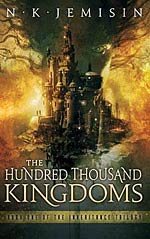
![]() thecynicalromantic
thecynicalromantic
11/4/2013
![]()
Over at Mark Reads, Mark has just finished up reading N. K. Jemisin's The Hundred Thousand Kingdoms, a copy of which I had picked up at Readercon over the summer. Since I had the book but hadn't begun reading it yet when Mark announced it as his next project, I tried to read it along with Mark, at the glacial pace of two or three chapters per week.
It turns out, I am not good at reading on that kind of a schedule. Sometimes I would accidentally read ahead; other times I'd forget to read a chapter on time. But the book was good enough that I kept coming back to it no matter how many times I screwed up the reading schedule, and now I have finished it.
The Hundred Thousand Kingdoms is about a woman named Yeine, the young leader of a small "barbarian" country called Darr. Yeine's mother, Kinneth, was once the heir to of the Arameri, the ruling family of the Hundred Thousand Kingdoms—functionally, the Arameri rule the world. Kinneth was disowned for marrying Yeine's father. Now Kinneth is dead, and Yeine is summoned to the Arameri city of Sky—an entire city elevated on a pillar, so it literally sits in the sky—by her grandfather. Here she is told she is now one of his three heirs—the others being his niece and nephew, Scimina and Relad—and that the three of them are now in competition to see who will rule next.
The story, however, is not entirely about the competition. (In fact, I think the competition is really the weakest part of the book—I'm not really sure how it works? It's never clear what the criteria are for determining a winner…) The book is largely about Yeine trying to figure out the circumstances of her mother's death and to learn more about who her mother was when she was an Arameri. Yeine also turns out to be unwittingly involved in a plot by the Enefadeh to get free. The Enefadeh are really the main plot in the story—they are gods that have been enslaved in corporeal form and given to the Arameri as weapons.
Currently, the universe is functionally monotheistic—only one god is in power, Itempas, also known as the Skyfather, who is the god of order and light and stability and all that sort of thing. However, once, there had been three ruling gods—Itempas, Nahadoth the Nightlord, and Lady Enefa, the goddess of life and death and transience and all that cool stuff. Itempas murdered Enefa and enslaved the Nightlord, along with all of the lesser gods, and gave them to the Arameri family, who had been the most loyal priests of Itempas. Itempas and the Arameri have run the world in a brutally orderly fashion ever since. (And I mean BRUTAL. The Arameri are basically what you'd get if Nazis were a royal family.)
The gods are some of the most fleshed-out characters in the book, besides Yeine (and, in a weird way, Kinneth, even though she's dead the whole time). Yeine develops a weird sort of romance with Nahadoth, although it takes her much longer to develop any sort of civil communication with Naha, Nahadoth's daytime self (who is basically a different person. And kind of a creeper). The other god we see the most of is Sieh, the god of childhood, who is the son of Enefa and Nahadoth, and is actually the oldest of the second generation of gods. Sieh is adorable, most of the time, and apparently it takes effort and energy for him to remain childlike—he grows up if he's too worn out. The other main gods that we see around Sky are Kurue, the goddess of wisdom, who is really quite obnoxiously cranky and stuck-up, and Zhakkarn, the goddess of battle. Enefa has… some cameos, as well.
Notable humans in Sky include T'vril, who is basically the head servant, and who becomes one of Yeine's few actual friends, and Viraine, the scrivener (basically a magician—scriveners perform magic by writing in the gods' language), who is manipulative and skeezy, but who turns out to have a big role in Kinneth's backstory. Scimina and Relad are really fairly minor characters—Scimina is prideful and sadistic in the extreme, and Relad is a sad drunk, and that's largely it.
Apart from my not really getting the competition plot, I liked this book a lot, largely because I like thing that are surprising and relentlessly political. Issues of race, economics, and power feature very, very heavily, and there is some interesting gender stuff in that Darr is a traditionally matriarchal society (Sky, interestingly, seems to be fairly egalitarian; murderous fuckwittery appears to be considered an appropriate pastime for all genders, provided it is enacted upon people poorer or browner than oneself). A lot of it is very heavy, but I managed to outsource most of my feelings of readerly torment to Mark, who emotes better than I do anyway. Now I have to get a hold of The Broken Kingdoms; I'm already a day behind…
Originally posted at http://bloodygranuaile.livejournal.com/36402.html
http://bloodygranuaile.livejournal.com